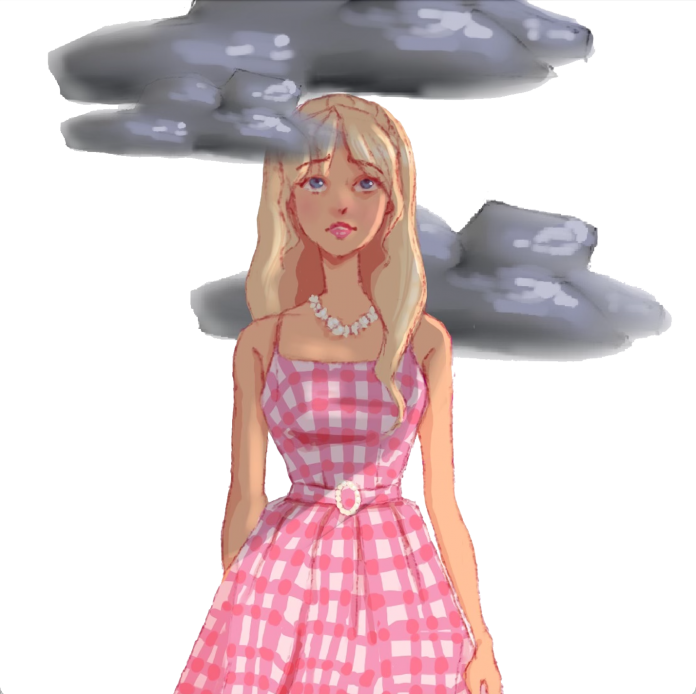Rachel Bartz ’25 is an International Relations major and Economics minor from San Jose, CA. She is a member of the Lutheran Student Association and Debate Society on campus. You can find her walking through Colonial Williamsburg or taking a class at the Rec. Contact her at ribartz@wm.edu.
The views expressed in this article are the author’s own.
I was a little late, but I saw “Barbie.” I went with my mom, which was serendipitous.
So much of it was exactly what I expected and wanted: Margot Robbie looking gorgeous in perfectly tailored outfits, witty takedowns of the patriarchy, catchy music and Ken (played by Ryan Gosling) obsessing over Barbie. But what I didn’t expect, and what I imagine most other viewers didn’t, was the strong thread of raw emotion throughout.
The first emotional punch I felt was Barbie’s abrupt question during her regular, fully-coordinated dance party attended by all the other Barbies. She suddenly pauses and asks, “Does anyone ever think about dying?”
I couldn’t believe what I was watching: Barbie having an intrusive thought. The scene was fleeting and played for laughs, with Barbie skillfully twisting her outburst into saying she was actually dying to dance, but the intrusive thought lingered.
Later, Barbie suddenly awakens from her night’s slumber, and there it is again: the thought of death. It ruins her entire morning; her shower is freezing, her food is expired or burnt and she falls while floating down into her convertible.
Intrusive thoughts have made the rounds on the internet. I’m sure the term has come up before, usually when people have a goofy, random notion like eating a banana with the peel on. But sometimes intrusive thoughts venture into territory that isn’t so humorous.
According to the Anxiety and Depression Association of America, “some unwanted intrusive thoughts consist of repetitive doubts about relationships, decisions small and large, sexual orientation or identity, intrusions of thoughts about safety, religion, death or worries about questions that cannot be answered with certainty.” They clash with who you believe you are and what you think should constitute your thoughts.
We see Barbie attempt to banish the thoughts away repeatedly, with no success. After being humiliated at a middle school, which I imagine is a relatable experience for many of us, Barbie sits on a park bench and does what I can only describe as meditation. She allows her emotions to pass without attempts to control them, focuses on the repetitive sounds of rustling leaves and cries it out.
There certainly is something satisfying about seeing a character like Barbie be successful in everything she does. It’s reminiscent of other girl power movies like “Legally Blonde,” in which another thin, conventionally attractive white woman is beloved by many and triumphant in various endeavors beyond just the romantic.
But as someone who has struggled with intrusive thoughts and a general reshaping of her conception of mental illness after coming to college, seeing Barbie have an intrusive thought and then feel isolated and unlike herself as a result was relatable in a way that was emotionally raw. It was also relatable to see her dress up and dance the night away, but not in quite the same manner.
Then came the scene that really got the tears flowing. Having been objectified by construction workers and chased by Mattel’s CEO (played by Will Ferrell), Barbie then rescues Barbieland from the patriarchy and is approached by her creator, Ruth Handler. After everything she’s been through to return to her perfected, manicured self, Barbie asks to be made human. Handler is understandably apprehensive. She tells Barbie that she’d like to show her something before agreeing to send her out into the real world, and then the emotional gut punch hits: a montage of girls becoming women, of mothers with their children, of milestones and accomplishments and of all the things in between.
Barbie cries again watching the montage, and in the theater, I did too. It is a compilation of many beautiful aspects of life as a woman, and it’s touching that Barbie wants to carve out her own path in a similar vein. But I think the more extraordinary realization — the one that was behind my tears — was that Barbie came to the real world, saw so many of its flaws and loved it anyway.
There must be something special about our world and worth living in it to the fullest, then, if Barbie, as her gorgeous, charming and well-dressed self, decided that this was where she wanted to be.

